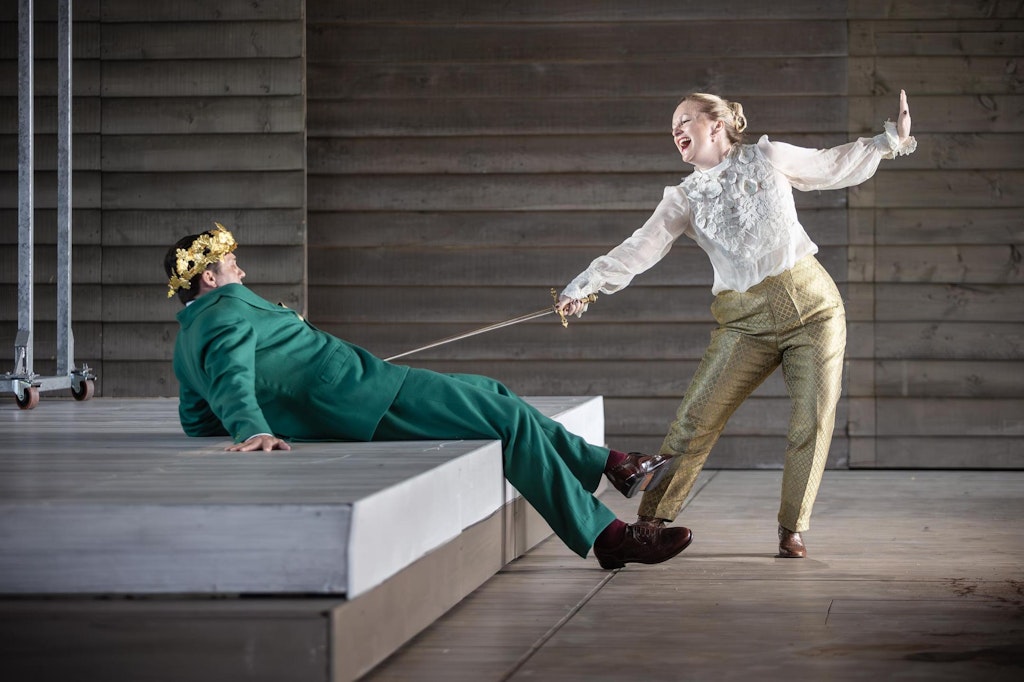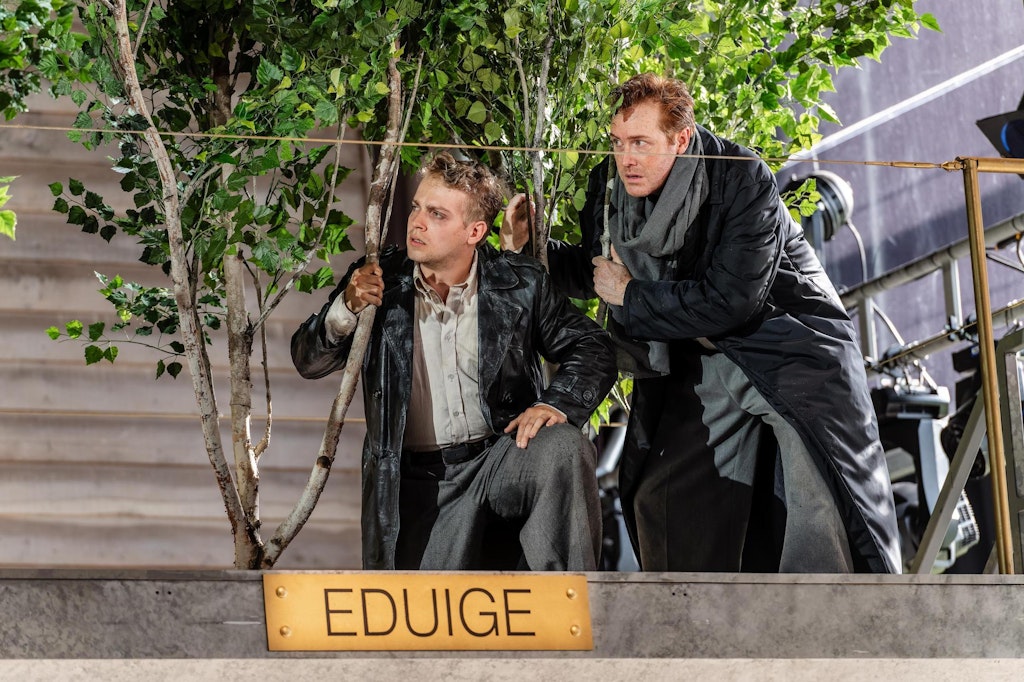Baroque opera is never that big on action, and Handel’s 1726 opera (the third he wrote in a big twelve months that produced the mammoth Giulio Cesare and pressure-cooker Tamerlano) is no exception. The only notable event — a coup by usurper Grimoaldo to overthrow ruler Bertarido — has already happened, and Bertarido is absent, presumed dead; now in the traditional manner Grimoaldo would like to take possession of widow Rodelinda too. But she has other ideas — which is lucky, since her husband pops up alive a bit later.
As everyone witters on about their plans, what emerges is a set of people curiously unsuited to their roles: Grimoaldo, a half-hearted tyrant inconveniently saddled with a heart and a bad conscience, deflated and unmanned by his failure to win over Rodelinda; Bertarido strangely ineffectual and interior; his amusing sister Eduige, a mixture of slighted grandeur and libido. Grimoaldo’s winger Garibaldo is a promising baddie but, like a Bond villain, spends his time talking about the aesthetics of power and violence rather than getting down to it. Only Rodelinda herself really knows what she’s doing. Everyone is at, or approaching, the end of their tether — Handel’s number one operating theatre, actually.

The result is a series of intense soliloquies and vivid rows that are so stark and basically motionless they can scare directors into doing silly things: as here, where Ruth Knight, evidently nervous of an empty stage, whistles up a gang of 14 ninja-like dancers who occasionally operate as henchpersons to Grimoaldo but more often as kind of evil spirits, animated by jittery animal movements, who launch into not terribly exciting dance routines behind one or another singer, like a particularly camp Eurovision act. This basically subtracts from the intense focus that Handel was at pains to create. Why would anyone want to look at anything but Lucy Crowe when she is singing “Ombra cara” at her “dead” husband’s memorial? — and yet all kinds of frantic and pointless stuff is going on elsewhere.
Tim Mead’s droopy Bertarido does what he can in the face of directorial lack of interest
Messing with Handel’s spotlight also means that — apart from Rodelinda, who, good for her, has caught the director’s interest — there is no real attention to character or relationship. Grimoaldo does a lot of Tony Blair-style smiling, but that’s about it. Bertarido frets, while his faithful advisor Unulfo smokes a lot. Handel and librettist Nicola Haym are steering these people towards breakdown, and the musical effect is cumulative intensity, dissipated here by the shifty gaze and peculiar attempts at humour — as when Bertarido suddenly appears as a gold-lamé-clad crooner (emerging from an alarming kitchen fire, what’s more). The opera’s actual humour — located in the preposterous baddie Garibaldo, itchy Eduige and fretful Unulfo — is nowhere to be seen.
Musically it’s a different story: all that focus lost on stage is present here, from the orchestra of The English Concert (currently involved in the insane task of video-recording every note Handel wrote for free public viewing), conducted with really attractive bounce and fieriness by Peter Whelan, to the singers. Lucy Crowe is always magnetic and hyper-absorbed in her roles, and is magnificent, a singer who doesn’t have to move a muscle to grab you by the throat, using a voice of huge warmth and expressiveness with extreme art. Kill Bill-style addenda by the director are strictly unnecessary, but she takes them in her stride; the whole effect is mesmerising, with little details of phrasing and variation and tone taking it beyond. It’s all mourning, longing and love, intensified by the duet she shares with Bertarido when they are briefly reunited, “Io t’abbraccio”, a moment where the ninjas do something actually effective, dragging the unhappy pair apart on the darkened stage.

Everyone else is more than fine, too, though all stymied to one degree or another by the staging. Tim Mead’s droopy Bertarido does what he can in the face of directorial lack of interest, the gorgeous sad pastoral “Con rauco mormorio” rather undone by the weird Vegas setup; but it’s a strong portrayal of lovelorn sorrow. Hugh Cutting’s confident Unulfo did best — his optimisms enables one of those bits of Handel magic where the notion that we might not be heading for tragedy suddenly appears: shafts of light pierce through his aria “Fra tempeste”, a magical moment as a high violin line steals out from behind the voice, a tiny detail with a massive effect.
This being the 18th century, there’s an upbeat ending to send everyone home happy, with Ed Lyon’s capricious Grimoaldo suddenly chumming up with everyone and laughing off the whole coup thang as a bit of a lark. And indeed, it does all feel curiously inconsequential, as if we’ve only had about half the opera Handel wrote: Rodelinda herself, for sure, but the rest has gone begging.












